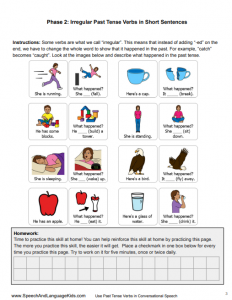How to Teach Irregular Past Tense Verbs
Irregular past tense verbs are verbs that change forms when they are used in the past tense.
“Run” becomes “ran”.
“Sit” becomes “sat”.
On this page, we’ll show you how to teach irregular past tense verbs in speech therapy, at home, or in the classroom. We’ll also give you a link to our Grammar Curriculum that includes a module on past tense verbs.
How to Teach Irregular Past Tense Verbs to Children and Teens:
Children with language delays and grammar/syntax problems often struggle with irregular past tense verbs. It doesn’t help that they don’t follow the rules!
For these children and teens, we can support them through speech therapy activities. However, caregivers and educators can also use these same strategies to support those individuals at home and in the classroom.
Below are the steps for teaching irregular past tense verbs to children and teens:
Sample Goal for Irregular Past Tense Verbs:
Client will correctly use past tense verbs (irregular and regular) with at least 80% accuracy during unstructured conversational speech when discussing past events.
Speech Therapy Activities for Irregular Past Tense Verbs:
- Regular Past Tense Verbs in Short Sentences: Client will correctly use regular past tense verbs (by adding “-ed” to the end of a verb) in short sentences with at least 80% accuracy when answering “what happened” about a past event or picture.
- Irregular Past Tense Verbs in Short Sentences: Client will correctly use irregular past tense verbs (by changing the verb to the correct past tense form) in short sentences with at least 80% accuracy when answering “what happened” about a past event or picture.
- Mixed Past Tense Verbs when Answering Questions: Client will correctly use regular and irregular past tense verbs when answering questions about a story or picture with at least 80% accuracy.
- Mixed Past Tense Verbs in Structured Conversation: Client will correctly use regular and irregular past tense verbs when providing answers to open-ended questions or prompts (such as “tell me about your last birthday party”) with at least 80% accuracy.
- Mixed Past Tense Verbs in Unstructured Conversation: Client will correctly use past tense verbs (irregular and regular) with at least 80% accuracy during unstructured conversational speech when discussing past events.
Strategies for Teaching Irregular Past Tense Verbs:
Use Before and After Pictures:
Show the before and then the after and ask “what happened?”. The child must use the correct past tense to talk about what happened.
Or, Act it Out:
Tell the child “watch me” and then do an action that you know has an irregular past tense verb.
Then, ask the student “what happened?” and have the student use the past tense to describe it.
Practice them Over and Over Again:
Much of using irregular past tense is just having to memorize what each one is. There aren’t a ton of rules and the rules that do exist have a ton of exceptions. It’s best to just explicitly teach each one and practice them over and over again.
Start Correcting and Reminding in Conversation:
Once they start to get the hang of it, start correcting them in conversation or repeating back their errors to see if they can fix it themselves. You want them to hear that it sounds wrong.
A Structured Curriculum for Teaching Grammar Skills:
I’m guessing that irregular past tense is not the only grammar skill that they’re struggling with, right?
When we teach grammar skills with a systematic approach, we can help children and teens make faster progress in their language skills.
Our Grammar/Syntax Curriculum is designed to do just that. With levels for all different ages, our step-by-step Curriculum will provide you with everything you need to systematically teach grammar and syntax skills.

About the Author: Carrie Clark, MA CCC-SLP
Hi, I’m Carrie! I’m a speech-language pathologist from Columbia, Missouri, USA. I’ve worked with children and teenagers of all ages in schools, preschools, and even my own private practice. I love digging through the research on speech and language topics and breaking it down into step-by-step plans for my followers.
Fun Fact: I sunburn very easily, it’s kind of ridiculous. I have to be very careful when out in the sun, especially if we travel South at all.
Connect with Me:




Hi, our daughter has severe speech delay and is now in resource classes in middle school. She has difficulty with past tense verbs so we often correct her in conversation.We are frustrated with our daughters 7th grade reading teacher because she works on dictation , which is very difficult for our daughter. It doesn’t really improve so there is focus on weaknesses and I believe its discouraging a bit to her. This teacher also brought her back to Wilson Reading book level 3 when she passed it last year and is on level 4 and doing well with a tutor at home that is working on reading with her as well. Often it is difficult still, to understand what she is trying to CONVEY. We have to ask her to slow down and start over to explain herself. Any thoughts on how we can make this better for her…? Thanks
Thank you for the tutorial video and flashcards!
You are most welcome, Laurin! Please let us know if you have any questions.
Thank you for this! What age/grade do you recommend starting to target irregular past tense verbs?
Hello, Maddy!
Thank you so much for reaching out. Unfortunately, we get a ton of questions every day about how to solve specific speech/language problems. Since we have such a small staff, we aren’t able to answer every question that comes through on the website, social media, or via email. If you are a parent, we suggest you reach out to a local speech-language pathologist who can work with your child directly and answer your question.
If you are another speech-language professional, we have created a membership where we pay a full staff to answer questions like this on a regular basis. We would be more than happy to answer your question inside the membership program. We’re able to answer more questions in here because we have a full library of questions that we’ve already answered so our staff can either link you to the answer if it exists, or write you a custom response if needed. We’d love to see you inside the membership!
Click Here to Become a Member: https://www.slpsolution.com/pediatric-signup/.